
How to Choose the Best Home Security Cameras for Your Property
ebook include PDF & Audio bundle (Micro Guide)
$12.99$7.99
Limited Time Offer! Order within the next:

In today's world, home security is more important than ever. With advances in technology, security cameras have become a vital part of ensuring the safety of our homes, belongings, and loved ones. With the increasing range of options available in the market, choosing the best home security cameras for your property can feel like an overwhelming task. However, understanding the essential factors and features to consider can simplify the decision-making process, allowing you to select the most suitable security solution for your needs.
This guide will explore the key factors you should consider when choosing a home security camera, the different types of security cameras, and the latest technologies that make modern security systems more effective than ever before.
Why Do You Need Home Security Cameras?
Before diving into the specifics of choosing the best home security camera, it's important to understand the role these devices play in enhancing your home security. Home security cameras are designed to monitor and record activity around your property, deterring criminals and providing peace of mind. Here's why you might need a home security camera system:
A. Protection Against Theft and Break-ins
The primary purpose of security cameras is to deter criminals from targeting your property. The sight of a visible camera can discourage burglars and vandals, reducing the likelihood of a break-in. If a crime does occur, the camera footage can help law enforcement catch the culprits.
B. Remote Monitoring
Most modern security cameras allow homeowners to monitor their property remotely through mobile apps or web portals. This feature provides convenience, allowing you to keep an eye on your home, even when you're not physically present.
C. Evidence in Case of Incidents
Cameras provide a reliable way to document activity on your property. This is especially useful in case of disputes, accidents, or incidents, as recorded footage can serve as evidence for insurance claims or legal purposes.
D. Peace of Mind
Knowing that your home is constantly monitored, especially when you're away, provides a significant sense of security. Whether you're traveling, at work, or simply enjoying a night out, home security cameras offer peace of mind.
Key Factors to Consider When Choosing a Security Camera
When selecting the best security cameras for your property, you need to assess various factors to ensure you get the right system for your needs. Here are some of the most critical considerations:
A. Camera Type
There are several types of security cameras available, each designed to serve different purposes. Understanding the differences between each camera type will help you make an informed decision.
-
Indoor Cameras Indoor security cameras are designed to monitor the interior of your home. They are typically smaller in size, and most feature two-way audio, motion detection, and night vision. If you want to monitor areas like living rooms, hallways, or entryways, indoor cameras are ideal.
-
Outdoor Cameras Outdoor cameras are built to withstand various weather conditions, such as rain, wind, and extreme temperatures. These cameras tend to have a more rugged design and often come equipped with features like weatherproofing, night vision, and a wider field of view to cover larger outdoor areas.
-
Wired vs. Wireless
- Wired Cameras: These cameras require physical cables to transmit video footage and receive power. They tend to provide more stable video quality and are ideal for long-term, uninterrupted monitoring. However, installation can be more complicated due to the need for running cables.
- Wireless Cameras: Wireless cameras connect to your home's Wi-Fi network and transmit footage without the need for cables. They are generally easier to install and more flexible in terms of placement. However, their video quality can be affected by Wi-Fi connectivity issues, and they may require more frequent maintenance due to battery life.
-
Battery-Powered vs. Plug-in
- Battery-Powered Cameras: These cameras run on batteries, making them more flexible and easier to install, as they don't require an outlet. However, you will need to replace or recharge the batteries periodically.
- Plug-in Cameras: Plug-in cameras are more reliable in terms of power supply, as they draw electricity from your home's electrical system. They are ideal for fixed locations but may require more installation work due to the need for outlets.
-
Smart Cameras Many modern security cameras are "smart," meaning they connect to the internet and can be controlled and monitored through a smartphone app. These cameras typically come with advanced features such as motion detection, real-time alerts, cloud storage, and integration with smart home systems like Alexa or Google Assistant.
B. Video Quality
Video quality is one of the most important factors to consider when selecting a home security camera. Clear and detailed video footage can make the difference in identifying intruders or gathering useful evidence.
- Resolution: Higher resolution cameras provide sharper, more detailed video. Cameras typically come in 720p, 1080p (Full HD), 1440p, and 4K resolutions. For most residential properties, 1080p cameras provide sufficient clarity, but if you want the best possible quality, 4K cameras are the highest standard available.
- Field of View (FOV): The field of view refers to how much area a camera can cover. A wider field of view allows the camera to capture more of the surroundings, reducing the number of cameras needed to cover a large area. Look for cameras with a 130-180° field of view for optimal coverage.
- Frame Rate: The frame rate of a camera determines how many frames per second (FPS) are captured in the video. A higher frame rate results in smoother video, making it easier to analyze fast-moving activity. Look for cameras with a frame rate of at least 15 FPS for good video quality.
- Night Vision: Many security cameras offer night vision capabilities that allow them to record clearly in low-light conditions. Infrared (IR) night vision typically ranges from 30 to 100 feet, with more advanced cameras offering longer distances. Ensure your camera has sufficient night vision range to capture details in the dark.
C. Motion Detection and Alerts
Motion detection is a crucial feature in modern security cameras. When a camera detects movement within its field of view, it can trigger an alert or begin recording. This is useful for monitoring activity in real-time and for conserving storage space by recording only when something happens.
- Sensitivity Settings: Many cameras offer adjustable motion sensitivity, allowing you to fine-tune the detection to avoid false alarms caused by minor movements (such as pets or tree branches) while ensuring that important events are captured.
- Smart Alerts: Smart security cameras send notifications to your phone, email, or even a smart device when they detect motion. Some systems can send real-time alerts when they detect human movement or unusual activity, helping you respond quickly to potential threats.
- Activity Zones: Some cameras allow you to set up specific areas within the camera's field of view where motion will be detected. This is useful if you only want to monitor particular areas, such as entry points, while ignoring less important zones.
D. Storage Options
Storage is a key consideration when choosing a security camera. The two primary types of storage options available are local storage and cloud storage.
- Local Storage: Cameras with local storage use SD cards or external hard drives to save video footage. This option provides you with direct access to your recorded data without any subscription fees. However, local storage may not offer as much space for long-term storage, and it can be vulnerable to theft if the camera is damaged or tampered with.
- Cloud Storage: Many modern security cameras offer cloud storage, where your footage is uploaded to remote servers. This allows for greater storage capacity and easier access to footage from any device with an internet connection. However, cloud storage typically requires a monthly or yearly subscription fee, and you should ensure the storage plan suits your needs.
E. Integration with Other Systems
If you have a smart home system, you may want to choose a security camera that integrates with other devices such as smart doorbells, smart locks, or smart lights. Integration allows you to create a comprehensive security network that you can control and monitor from a single app or platform.
F. Weather Resistance (For Outdoor Cameras)
If you're installing cameras outside, ensure that they are designed to withstand the elements. Look for cameras with an IP rating of IP65 or higher, which indicates they are resistant to dust and can handle exposure to rain and snow.
Additional Features to Consider
In addition to the key factors mentioned above, there are several other features that can enhance the functionality of your security cameras:
A. Two-Way Audio
Some cameras come equipped with two-way audio, allowing you to communicate with people at your property. This is especially useful for interacting with delivery drivers or visitors without opening the door.
B. Sirens or Alarms
Certain security cameras include built-in sirens or alarms that can be triggered if suspicious activity is detected. This feature can help scare off intruders before they have a chance to break in.
C. Privacy Features
Some cameras come with privacy features that allow you to disable video recording during certain times of the day or when you're at home, ensuring that you maintain privacy when necessary.
Conclusion
Choosing the best home security cameras for your property requires careful consideration of your needs, budget, and the features that matter most to you. By understanding the various types of cameras, video quality, storage options, and additional features, you can make an informed decision that will provide comprehensive security for your home. Whether you're looking for cameras for indoor monitoring, outdoor surveillance, or smart integrations with your home automation system, the right security camera system can greatly enhance your peace of mind and provide essential protection against potential threats.

How to Create a Calm and Organized Bedroom
Read More
How to Make Money Online as a Slogan Creator: 10 Actionable Ideas
Read More
How to Reduce Noise from HVAC Systems in Your Home
Read More
How to Use ADT Motion Sensors in Combination with Cameras for Better Security
Read More
How to Use Lighting to Create a Boho Chic Vibe at Home
Read More
How to Use Lighting to Set the Mood for Different Occasions
Read MoreOther Products

How to Create a Calm and Organized Bedroom
Read More
How to Make Money Online as a Slogan Creator: 10 Actionable Ideas
Read More
How to Reduce Noise from HVAC Systems in Your Home
Read More
How to Use ADT Motion Sensors in Combination with Cameras for Better Security
Read More
How to Use Lighting to Create a Boho Chic Vibe at Home
Read More